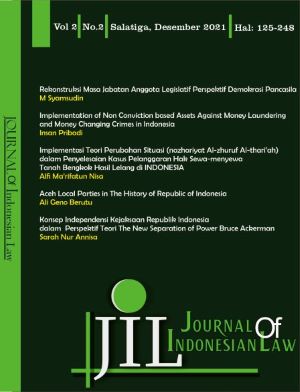ANALYSIS OF KPK (CORRUPTION ERADICTION COMMISSION) POSITION AFTER THE CONSTITUTIONAL COURT DECISION NUMBER 70/PUU-XVII/2019 FROM THE PERSPECTIVE OF THE NEW SEPARATION OF POWERS
DOI:
https://doi.org/10.18326/jil.v4i1.1003Keywords:
The New Separation of Power, Corruption Eradication Commission, Constitutional Court DecisionAbstract
In 2019 Law Number 19 of 2019 concerning the Second Amendment to Law Number 30 of 2002 concerning the Corruption Eradication Commission was passed. The second amendment to the KPK Law has changed the position and structure of the KPK institution quite a lot. In the same year, a review of Law Number 19 of 2019 was proposed in the Decision of the Constitutional Court Number 70/PUU-XVII/2019. This study will focus on analyzing the position of the KPK after the issuance of the Constitutional Court Decision Number 70/PUU-XVII/2019 by using the theory of The New Separation Of Power. This research is a normative legal research (legal research) that uses two approaches, namely the statutory approach and conceptual approach which in this case uses the Constitutional Court Decision Number 70/PUU-XVII/2019 and the theory The New Separation of Powers. The results of this study indicate that the Court decided that the state institution KPK is part of the executive power clump on the grounds that the KPK carries out executive functions in the executive domain. On the other hand, The New Separation Of Powers theory sees KPK as having to be included outside of the three main branches of power which in The New Separation Of Powers theory is referred to as a "new branch of power" or "fourth branch of power" because the KPK carries out its mixed functions and also because the KPK fulfills the characteristics of an independent state institution.








